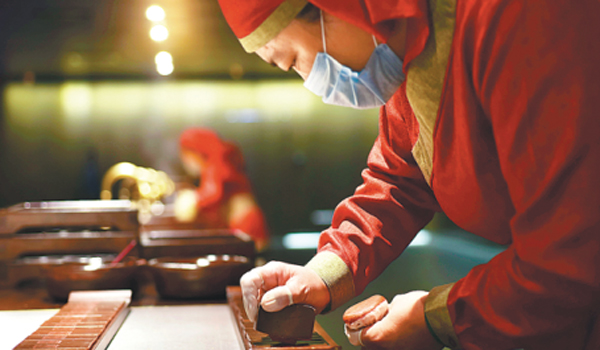Guards of honor
 |
|
Some of the Chinese time-honored brands that have been bywords for older generations faded from view but have then made spectacular comebacks. [Photo provided to China Daily] |
Every day, 21 bags of solid glue need to be lifted by hand and poured into a big vessel to be dissolved.
Another important step in production that even modern technology seems incapable of providing ready help for is heat control.
The ink glue is in an optimum state in a very short time frame after about four hours' heating, and removing it from the heat too soon or too late can ruin the glue, so the whole exercise demands a huge amount of experience, Yin says.
"You have to stand watch over the pot for the duration of the long process."
It is this devotion to ensuring everything is just right that has contributed to the ink brand's quality and enduring renown.
"Our ink is thick and shiny, and is highly water resistant," Yin says.
Xie Songdai of Hunan province created the first Yidege calligraphy ink in 1865. Until then, Chinese had used natural graphite for writing since the Yin-Shang Period (1600-1046 BC).
All ink was derived from this solid block, which was grounded with the help of water, before the resulting liquid was applied to the brush. Xie saw this process as irksome and time wasting, especially for those sitting imperial exams.
After trial and error he settled on lampblack and a few other auxiliary materials and finally came up with the liquid ink.
He opened the first Yidege shop in Beijing in 1865, and before long the business expanded to Tianjin, Shanghai, Xi'an and Zhengzhou, Henan province.
Almost all calligraphers in modern times have used Yidege's liquid ink, and it was named a Chinese time-honored brand in 2006. Its ink-making technique was named a national intangible cultural heritage in 2014.
The ink dries quickly and has a fragrance - the result of traditional Chinese medicine ingredients such as borneol and musk being added - that many aficionados appreciate.
Just as Yidege ink has become a must-have for calligraphers, Juancheng Pixian Thick Broad-Bean Sauce has become a must-have ingredient for those who are preparing Sichuan food.
On the outskirts of Chengdu, Sichuan province, hundreds of giant dark brown porcelain pots lie next to one another in an open-air square at the Juancheng Pixian Thick Broad-Bean Sauce factory.
Broad beans with other ingredients are fermenting in the sun, and they will eventually turn into the Pixian thick broad-bean sauce that is a vital ingredient of many Sichuan dishes.
Zhang Anqiu, 56, takes the lid off a pot to check the fermentation.
This is a daily ritual, and all pots need constant attention, Zhang says.
The mixture needs to be exposed to the sun, covered when it rains, exposed to dew by night and be covered again for some time to retain the dampness.



















